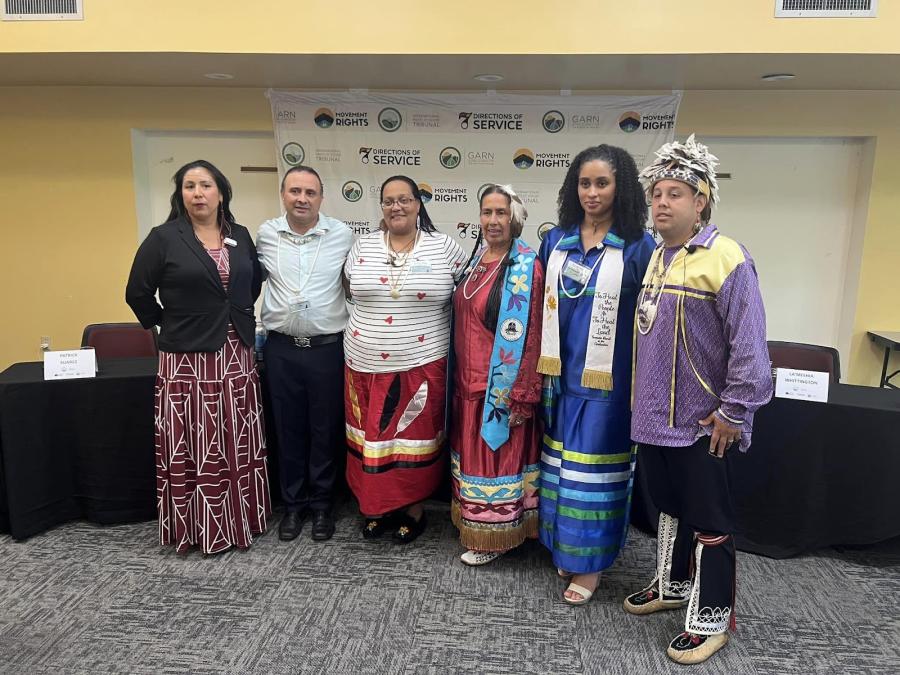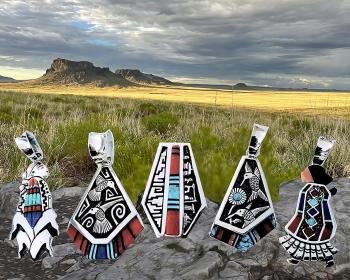
On May 6, 2023, as England was coronating a new king after weeks of mourning the passing of their previous ruler, Mashpee Wampanoags were also taking the day to fill the void of leadership left by the death of Vernon “Silent Drum” Lopez, the chief of Mashpee Wampanoag Tribe for the last 25 years of his life. Silent Drum was raised as a chief in the tradition of the Wampanoag Peoples that stretches back to pre-colonial times. Unlike the tradition of monarchs, the tradition of raising a chief is a democratic one. The process of caucusing is simple: voters line up behind the nominee they support, and the bigger crowd wins.
While our elections in the United States are filled with smear tactics, attack ads, and debates that pit candidates against each other for prime time entertainment, in a traditional caucus, no one speaks badly of their opponent. In fact, the nominees don't speak at all. Potential leaders are nominated by community members who stand up and speak to the community about why they believe their nominee would be well suited to lead the people. As a Peoples, we value humility, and are wary of those who seek positions of power. The self-aggrandized politicians who are well suited to the mudslinging contests of American politics might well not have anyone to speak on their behalf in our traditional system. When Silent Drum was raised as a chief, he said of the people uniting behind him, “I was surprised by it, to be quite honest.” Truly a humble man.
In speaking with Silent Drum’s daughter, Marlene Lopez, who holds the traditional position of a Clan Mother in Mashpee, she told me that over the past three years the Sunday morning Clan Mothers meetings had brought forward a number of potential candidates for the next chief. In this way, the Clan Mothers of Mashpee held on to the traditional process of raising a new chief as had been done for millennia before. She also said they had to hold firm to their decisions about time and place, even when facing pressure from the Elders to move the date further into the summer to gain greater attendance, as many community members travel to be in Mashpee for our annual pow wow. In spite of the spring date, between 300-400 Tribal members came out to participate in the ceremony—the biggest gathering recorded in that ceremonial circle.
I am thankful that when we came together to choose our new leader we did not have to choose the lesser evil, but instead had the pleasure of choosing the greatest good among us. We came together in the same place as we raised Silent Drum at our ceremonial circle at 55 Acres. The ceremony began by dividing based on gender and entering the circle from their respective doors. Tribal members were spiritually cleansed by smudging with cedar and sage smoke. Our Medicine Man, “Soaring Eagle” Guy Cash, prepared the altar, started the sacred fire, and spoke to the people. Next, our Tribal Chairman, Brian Weeden, shared the song for the “Welcome Dance,” and the people danced together. Then, the nominating process began.
Four people were nominated. One Tribal member had traveled from far western Massachusetts and was relatively unknown by people in Mashpee. He was nominated by his brother. Another nominee was Marlene Lopez, who was nominated by Tribal member Paula Peters. Buddy Pocknett, an avid fisherman and culture keeper and the son of the late Chief Vernon “Sly Fox” Pocknett, the predecessor of Silent Drum, was nominated by his sister, Sherry Pocknett. All in attendance strained to hear the softly spoken words of Darryl Wixon as he nominated Earl Mills Jr., a Sundancer and son of Chief Earl “Flying Eagle” Mills Sr.
Silent Drum lived to be 100 years old, a centurion, something most people don't achieve. However, in the understanding of his mortality, he had requested that the people come together and start to consider who would succeed him as the next chief. The community had three choices that were well suited to the role; all of them had tried to turn away from the task saying that the others might be more qualified. Humbleness and humility are valued characteristics for leadership in our community, as are initiative, knowledge, compassion, and generosity. As Elder matriarchs of their respective clans, the Clan Mothers have watched these candidates grow up from the time they were children, and have seen their characters develop over a lifetime. The matriarchs of their families hold a significant role in vetting and nominating candidates, but ultimately it is up to the community as a whole to decide.
Clan Mother Marlene Lopez
After all the words were spoken, Medicine Man Cash called for the people to vote with their feet and stand behind the leader they supported. The people quickly separated into three camps, with Pocknett, Mills, and Lopez each having the support of dozens of Tribal members. Lopez was the first to concede, having only about three or four dozen supporters. As her supporters continued to stand behind her, they added their numbers to stand behind Pocknett. With the circle now only divided in two, Sherry Pocknett spoke up to state the obvious: “They have it, it’s clear there are more people on that side.” With no count, no tally, no hanging chads, and no calls to intimidate the Georgia state governor, Buddy Pocknett declared Earl Mills the new chief: “I give in, you are our new Chief.”
The two men extended their hands to each other in a handshake that turned into a hug. Mills then spoke his first words as the new chief of Mashpee: “I am honored to be chosen as your chief. I don't know who here knows who Annawon was...at the end of King Phillip’s War, Mettacom gave his wampum belt to Annawon to hold on to for the people. As his Paneese, or his lead warrior, he was the last to surrender in that war. Every chief needs warriors to help lead the people, and Buddy, as we see the people behind you, you are a leader, too. And if I am the Chief, I would ask you to be my Paneese.” Within 10 minutes the issue was decided; the people together of one mind, one heart, united, not divided. There was no talk of insurrection, no plan to storm the Tribal government center. While everyone who was able to garner support was the son or daughter of a chief, the title was not inherited. Democratically, the people chose a leader, not a ruler.
Buddy Pocknett with his wife Renee. Photo courtesy of Trish Keliinui.
In the Americas, we have had democracy for thousands of years in a form that has included all levels of wealth and women as well as men. Traditionally citizenship was something people were born into, and for those newcomers who came to live among us, their children would be born as full citizens. Our citizenship was never exclusive to “race” until the concept was imposed on us by racialized colonial oppression. These particular forms of democracy that have been present in the Atlantic seaboard have had a vastly understated influence on what we call American democracy, as can still be seen in the word caucus, which is still practiced to this day.
As the continued relevance of kings and crowns is drawn into question and the doctrine of discovery repudiated, perhaps it is time to consider the value of the original jurisdictions of colonized lands. Is the system of Super PACs and financial donations from corporations producing the best leadership? When political parties are considered private entities and exempt from fair elections, are the nominees really the leading candidates, or just the imposed will of superdelegates? When we reduce elections to a mere 51 percent majority rule as opposed to clear margins of victory, we fall into the more divisive and polarized figures, who, in turn, seek to exploit wedge issues that further divide us as a nation.
As we see land returned to Indigenous hands, we also need to see a re-empowerment of Tribal government's jurisdictional authority. As Tribal Nations, we need to be able to function as other nations do, with the ability to incorporate new citizens and determine our own standards of inclusion, instead of being relegated to dependent sovereigns based on racialized identity. As with any nation, we are our best when we work together for a common future, and our strongest when we are united, not divided. Unity comes from building consensus behind leaders, not from being beholden to rulers.
--Hartman Deetz (Mashpee Wampanoag) has been active in environmental and cultural stewardship for over 20 years. He is a traditional artist as well as a singer and dancer, having shown his art in galleries and performed for audiences from coast to coast across the U.S. He is currently a 2023-2024 Cultural Survival Writer in Residence.
Top photo: Aquinnah Pocknett (left) congratulating the newly raised Chief Earl Mills Jr. Photo courtesy of Russell Peters.



